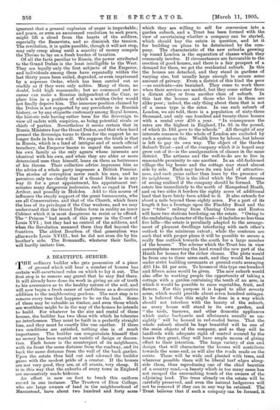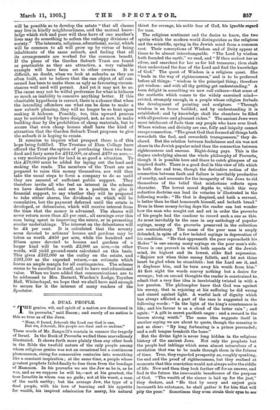of ground which will bear a number of houses has
certain well-ascertained rules on which to lay it out. The first step is to remove any gravel that he may find there. It will already have done its work in giving an air'of truth to his assurances as to the healthy nature of the soil, and will now begin a fresh career of usefulness as a decorative addition to the neighbouring gardens. The next step is to remove every tree that happens to be on the land. Some of them may be valuable as timber, and even those which are-worthless might be in the way of the houses he intends to build. For whatever be the size and rental of these houses, the builder has two ideas with which he tolerates no interference. They must be built in a perfectly straight line, and they must be exactly like one another. If these two conditions are satisfied, nothing else is of much importance. The builder can congratulate himself that no money has been wasted on variety of design or decora- tion. Each house is the counterpart of its neighbours, with its front the same distance from the roadway, and its back the same distance from the wall of the back garden. Upon the estate thus laid out and adorned the builder gazes with the modest pride of a. creator. If the houses are not very good, they are, at all events, very cheap. It is in this way that the suburbs of every town in England are successively made hideous. An effort is now on foot to break this uniform record in one instance. The Trustees of Eton College, who are large owners of land in the neighbourhood of Hampstead, have about two hundred and forty acres which they are willing to sell for conversion into a garden suburb, and a Trust has been formed with the view of ascertaining whether a company can be started, which should buy the estate in question, and let it for building on plans to be determined by the com- pany. The characteristic of the new suburbs growing up round London is the separation of classes which they commonly involve. If circumstances are favourable to the erection of good houses, and there is a fair prospect of a, demand for them, we get the residential suburb. In this the houses are detached, and they stand in gardens of varying size, but usually large enough to secure some amount of privacy. From a district of this kind the poor —as residents—are banished. They come to work there when their services are needed, but they come either from a distant alley or from another class of suburb. In this last the houses and those who live in them are alike poor ; indeed, the only thing about them that is not of a mean type is the rates. In one such suburb of London, we are told, there is a population of sixty-three thousand, and only one hundred and twenty-three houses with a rental over £50 a year. " In consequence the rates are the highest in England, lls. 3d. in the pound, of which 2s. 10d. goes to the schools." All thought of any interests common to the whole of London are excluded by such a system as this. Wealth lives by labour, but labour is left to pay its own way. The object of the Garden Suburb Trust—and of the company which it is hoped may grow out of it—is the amalgamation of classes in the same district. The artisans and the well-to-do are to live in reasonable proximity to one another. In an old-fashioned village the big house and the cottage may stand almost side by side. Each may have its own kind of attractive- ness, and each gains rather than loses by the presence of its neighbour. This is the ideal which the Trust dreams of seeing realised if the company should be formed. The estate lies immediately to the north of Hampstead Heath, and on two sides it borders the eighty acres of additional land that have lately been added to it. It also extends for about a mile beyond these eighty acres. For a part of its length it has a frontage upon the Finchley Road and the new " tube " railway from Charing Cross and Euston will have two stations bordering on the estate. " Owing to the undulating character of the land—it includes no less than five hills—the estate is peculiarly adapted to the arrange- ment of pleasant dwellings interfering with each other's outlook to the minimum extent ; while the contours are such that with proper plans it will be possible to secure a really fine outlook towards the south for a large number of the houses." The scheme which the Trust has in view contemplates reserving the land round the new part of the Heath for houses for the richer classes. The plots would be from one to three acres each, and they would be leased under strict building covenants at ground-rents averaging £85 14s. 2d. per acre. To houses of this type one hundred and fifteen acres would be given. The new suburb would also offer to working people the opportunity of taking a cottage with a garden containing the tenth of an acre, in which it would be possible to raise vegetables, fruit, and flowers. For this purpose it is hoped to allot seventy acres, which would provide about seven hundred cottages. It is believed that this might be done in a way which should not interfere with the beauty of the suburb, as every house will stand in its own garden, and " the tools, barrows, and other domestic appliances which make backyards and allotments usually so un- sightly " will be housed in red-roofed barns. That the whole suburb should be kept beautiful will be one of the main objects of the company, and as they will be landlords with adequate right of control secured by the leases they grant, they will have ample means of giving effect to their intention. The large variety of size and design that will characterise the houses will contribute towards the same end, as will also the roads made on the estate. These will be wide and planted with trees, and wherever possible there will be liberal turf edges along- side them, thus reproducing one of the chief beauties of a country road,—a beauty which in too many cases has not escaped the encroaching touch of the owners of the adjoining land. The trees already on the estate will be carefully preserved, and even the natural hedgerows will not be removed if they can in any way be retained. The Trust believes that if such a company can be formed, it will be possible so to develop the estate " that all classes may live in kindly neighbourliness, and the mutual know- ledge which rich and poor will thus have of one another's lives may do something to soften the unhappy divisions of society." The interests, religious, educational, social, which will be common to all will grow up by virtue of being inhabitants of the same suburb, and feeling that all its arrangements are worked for the common benefit. If the plans of the Garden Suburb Trust are found as practicable as they are attractive, a very valuable example will have been set to other owners. It is difficult, no doubt, when we look at suburbs as they are often built, not to believe that the one object of all con- cerned has been to make them as ugly as favouring circum- stances well used will permit. And yet it may not be so. The cause may not be wilful preference for what is hideous so much as inability to conceive anything better. If this charitable hypothesis is correct, there is a chance that when the intending offenders see what can be done to make a new suburb pleasing, they will no longer be so bent upon making it hideous. Possibly, too, this upward process may be assisted by by-laws designed, not, as now, to make building dear by the prohibition of cheap materials, but to secure that even cheap houses shall have the kind of attraction that the Garden Suburb Trust proposes to give the suburb it is hoping to create.
It remains to inquire what prospect there is of this hope being fulfilled. The Trustees of Eton College have offered the Trust the option of purchasing these two hun- dred and forty acres for £112,000, or about £470 an acre,— a very moderate price for land in so good a situation. To this £70,000 must be added for laying out the land and making the roads. The members of the Trust are not prepared to raise this money themselves, nor will they take the usual steps to form a company to do so until they are assured of sufficient public support. They therefore invite all who feel an interest in the scheme we have described, and are in a position to give it financial support, to say whether they will be prepared to take either shares, the dividends on which will be cumulative, but the payment deferred until the estate is developed, or debentures, which will receive interest from the time that the money is advanced. The shares will never return more than £5 per cent., all earnings over this sum being spent in improving the estate, or in promoting similar undertakings. The interest on the debentures will be £4 per cent. It is calculated that the seventy acres devoted to artisans' houses and gardens may be taken as worth £450 per acre, while the hundred and fifteen acres devoted to houses and gardens of a larger kind will be worth £2,000 an acre,—in other words, will yield ground-rents calculated on this basis. This gives £182,000 as the outlay on the estate, and £261,500 as the expected return,—an estimate which leaves an ample margin for all contingencies. The scheme seems to be excellent in itself, and to have real educational value. When we have added that communications are to be addressed to Mrs. Barnett, Warden's Lodge, Toynbee Hall, Whitechapel, we hope that we shall have said enough to secure for it the interest of many readers of the Spectator.











































 Previous page
Previous page